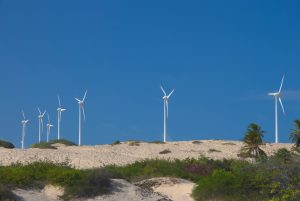Last week, the Bishop of the Diocese of Mannar along with three prominent environmentalists, filed a public interest litigation in the Sri Lankan Supreme Court, challenging the proposed 250 MW Mannar Wind Power Project.
In February 2023, Sri Lanka’s Board of Investment approved the development of the $442-million wind power project by Adani Green Energy. Wind power plants were to be built in Mannar and Pooneryn in Northern Sri Lanka.
Indian billionaire Gautam Adani’s Adani Group is also developing a $700-million container terminal at the strategically located Colombo Port. While Adani’s projects have faced setbacks and criticism previously, the litigation against Adani Green Energy is the first legal challenge facing the formidable Adani Group in Sri Lanka.
The legal petition in the Supreme Court has challenged the procurement process and construction of the project by Adani Green Energy.
It names 67 respondents, including the Cabinet of Ministers, the Sri Lanka Sustainable Energy Authority (SLSEA), the Central Environmental Authority (CEA), the Board of Investment, the Ceylon Electricity Board, the Public Utilities Commission Sri Lanka, and the Attorney General. In addition to raising concerns about the credibility of the project’s environmental impact assessment (EIA) and the role of the SLSEA, the petition highlights procedural issues in the awarding of the contract and questions the characterization of the project as a government-to-government deal.
The petition challenges the basis for the negotiated tariff. It argues that the tariff of $0.0826, or 8.26 cents per kilowatt-hour (kWh) for 20 years would lead to financial losses for the country and burden consumers.
It was reported that a Technical Evaluation Committee appointed by Sri Lanka to negotiate the Adani project had recommended to the government that a unit of electricity should be bought for $0.05 per kWh. Independent Sri Lankan energy experts have pointed out that Adani is selling power to the Indian state at less than $0.04 per kWh.
The petitioners also say that despite the project’s national importance, the two sides have not made data available for public scrutiny. The petition requested the Court to order the release of all files and records, including bids for the Mannar and proposed 234 MW Pooneryn plants; deliberations and negotiations; Cabinet decisions; unit price discussions; and criteria for project assessments.
The petition argues that like most EIA reports on major projects in the past decade, the EIA on the Mannar wind power project is mere eyewash. The EIA was manipulated to award the project to Adani, it says.
The petitioners also wondered why the Power and Energy Minister acted as the project’s approving authority when there is a designated body — the CEA — for such tasks.
There is no transparency regarding the lease of 202 hectares on Mannar Island for the project, nor information on compensation for affected landowners. The EIA also did not adequately evaluate alternative sites — Ambewela, the South East coast, Kalpitiya, and Jaffna — or provide a rationale for choosing Mannar Island.
The petition emphasizes the importance of Mannar Island as a focal point of the Central Asian Flyway, making it crucial for conservation and tourism. In March this year, Prof. Sampath S. Seneviratne of the University of Colombo’s Department of Zoology and Environment Sciences told The Island that around 15 million birds migrate to Sri Lanka from 30 countries each year. “We are going to establish 52 windmills that have 96-metre rotor blades that rotate at about 100 km per hour in the path of these birds,” he said.
The petitioners seek a declaration from the Supreme Court that their fundamental rights and those of the citizenry have been violated and that the decisions to award the project to Adani are wrongful and should be declared illegal. The petition aims to further the national interest by preserving and protecting public property, the environment, flora and fauna, public finances, and the rights and freedoms of the general public and future generations of Sri Lanka.
The Adani Group has emerged as a major player in Sri Lanka’s renewable energy sector in recent years, entering the country amidst increased Indian geostrategic presence in the Indian Ocean island, especially after India provided $4 billion worth of credit during the country’s financial crisis in 2022.
However, the Group’s presence in Sri Lanka has been fraught with controversy. Most Sri Lankans believe that giving Adani a number of large and strategic projects is the Ranil Wickremesinghe government’s way of repaying the debt. The Adani Group’s transformation from a medium-scale enterprise to an economic powerhouse over the past two decades is closely linked to the owner’s relationship with Prime Minister Modi.
In June 2022, M.M.C. Ferdinando, chairman of the state-run Ceylon Electricity Board, informed Parliament’s Committee on Public Enterprises that the Sri Lankan government had faced pressure from Prime Minister Modi to award renewable energy project tenders to the Adani Group.
Sri Lanka’s opposition parties view the government’s agreements with Adani as “back door” deals. Environmentalists and civil society organizations too have protested the social-environmental impact of these agreements. What these groups often lack is the financial resources and institutional backing necessary for a prolonged battle with a powerful multinational company.
Anti-Adani sentiments in Sri Lanka can be expected to grow in the coming years, and the concerns of those who oppose agreements with the Adani Group will be validated by the petition filed recently by Sri Lanka’s powerful Catholic Church.
The Catholic Church has shown that it can be persistent in pursuit of its objectives and this, coupled with the high possibility of the election of a less pro-India government in Sri Lanka later this year would make Adani’s operations in the island more difficult.

































